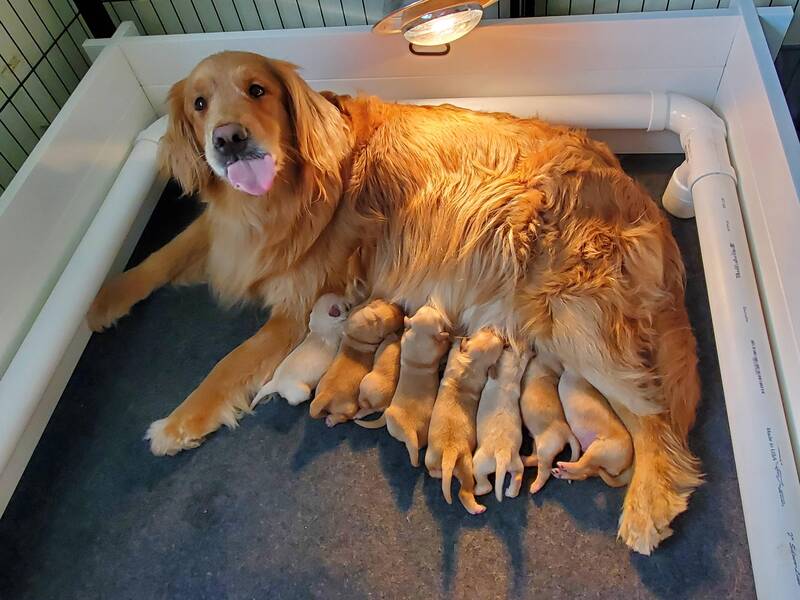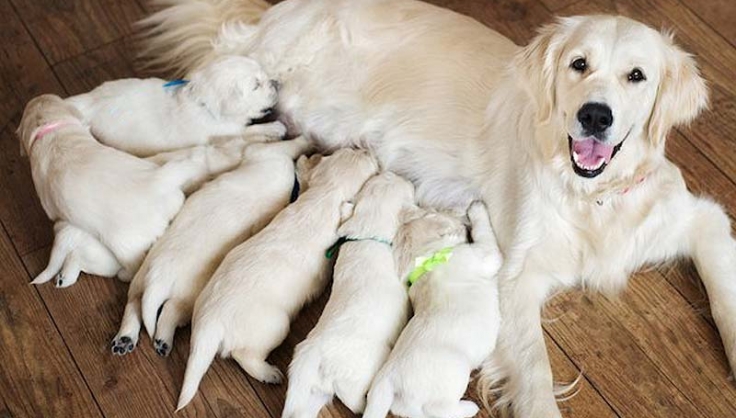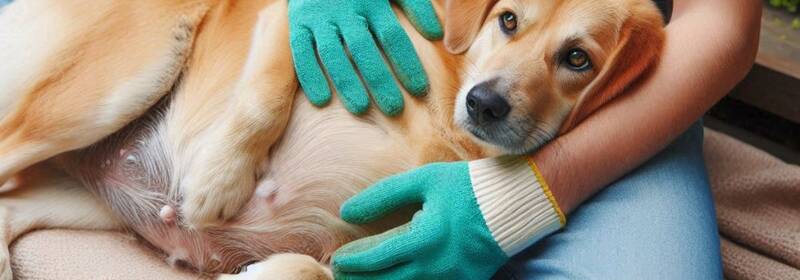We all know how long a human pregnancy lasts – it takes nine months for the infant to gestate. It makes sense to wonder how that compares to your favorite animal, the fabulous Goldie. So, how long are Golden Retrievers pregnant?
If it’s the first time you breed your female dog, or there has been an “unexpected accident,” this is the article for you! The useful information we provide here will have you prepared for the big day. Our team has assisted several dogs with their pregnancies, and nothing is more rewarding than welcoming a new litter of puppies into the world. Read on – here’s everything you need to know about Golden Retriever gestation.
How Long Are Golden Retrievers Pregnant?

The typical gestation period for Golden Retrievers is around 63 days, though it can vary from 58 to 68 days. This variation may depend on several factors, each playing a crucial role in the pregnancy duration:
- Litter size: The number of puppies can influence gestation length. Larger litters might lead to slightly shorter pregnancies as the mother’s body adapts to accommodate multiple puppies. It’s nature’s way of ensuring the pups don’t grow too large before birth.
- The mother’s age: Just like in humans, a dog’s age can affect pregnancy. Older Golden Retrievers might experience longer pregnancies compared to younger females. Their bodies may take more time to nurture the developing puppies.
- Genetics: Your Goldie’s family history can play a part in pregnancy duration. Some bloodlines might have tendencies towards either shorter or longer pregnancies. This is why knowing your dog’s lineage can be helpful.
- Environmental factors: While many dog owners overlook this factor, external conditions matter too. Stress levels and nutrition significantly impact pregnancy length. A calm, stress-free environment and a well-balanced diet are crucial for a healthy pregnancy. High stress or poor nutrition can lead to complications and may alter the gestation period.
By understanding these factors, you can provide the best care for your pregnant Golden Retriever and be extra cautious about warning signs.
Stages of Golden Retriever Pregnancy

Now, let’s walk through the journey of your Golden Retriever’s pregnancy, stage by stage. It’s an exciting time, and knowing what to expect will ensure that your soon-to-be mom gets the veterinarian care she needs to deliver healthy babies.
Early Stage (Weeks 1-3)
The early stage of pregnancy is a subtle time. You might notice a few changes in your Golden Retriever during these first few weeks. Here’s what’s happening:
- Week 1: The fertilized eggs travel to the uterine horns. Although the period is crucial, you won’t see any external signs yet.
- Week 2: The eggs implant in the uterine lining. Your dog might experience some light spotting, but don’t worry – this is normal.
- Week 3: The embryos begin to form. Some dogs might experience morning sickness, just like humans. If you notice your Goldie turning her nose up at food or seeming a bit under the weather, this could be why.
During this stage, we recommend keeping up with your dog’s routine. Normal exercise and diet are fine but avoid any strenuous activities.
Middle Stage (Weeks 4-6)
At this stage, things become more noticeable. Your Golden Retriever’s body is changing to accommodate the growing puppies:
- Week 4: The embryos are now about the size of walnuts. Your dog’s appetite might increase, and you may notice her nipples becoming more prominent.
- Week 5: The puppies are developing rapidly. You might see your dog’s belly starting to swell slightly.
- Week 6: The puppies now have recognizable features. This is often when an experienced veterinarian can confirm pregnancy through palpation.
This is the time to increase your dog’s food intake slightly. Consult with your vet about the best nutrition plan. Feed them with the best adult dog food for golden retrievers to ensure they get enough essential nutrients.
Late Stage (Weeks 7-9)
Here comes the home stretch! This is when the changes become most obvious:
- Week 7: The puppies are nearly fully formed. Your Golden Retriever’s belly will be noticeably larger, and you might even see the puppies moving!
- Week 8: The puppies are getting into position for birth. Your dog might start nesting behaviors, looking for a quiet, safe place to have her puppies.
- Week 9: It’s almost time – your dog might become restless and her appetite might decrease. She’s preparing for labor.
In these final weeks, your Golden Retriever needs plenty of rest and gentle exercise. Keep a close eye on her and be prepared for the birth to happen any day.
Caring for Your Pregnant Golden Retriever

Caring for a pregnant Golden Retriever involves more than just waiting for the big day. It’s about ensuring she’s comfortable, healthy, and ready for the challenges of motherhood. Let’s break down the key aspects of care:
Nutrition
In general, pregnant dogs require more nutrients and calories. However, that doesn’t mean you should increase her food intake throughout the pregnancy. Instead, it’s best to adjust her diet based on each stage:
- First 5 weeks: Stick to the regular diet for adult Golden Retrievers. Extra calories are not necessary yet.
- Weeks 6-9: Increase her meal by 15-25% as she’s eating for an entire litter now! At the middle stage, your Goldie will require about twice the calorie intake you feed her before the pregnancy.
- Last 3 weeks: Feed your soon-to-be mom a high-quality puppy food or a specially formulated pregnancy diet. These get her body prepared for breastfeeding and provide the extra nutrients needed for the final phase of puppy development. Your Goldie should continue to eat this diet while she is nursing her puppies.
As long as she’s getting the right diet, your Golden Retriever doesn’t need any vitamins or supplements. Based on her health condition, however, your vet will recommend specific products if they’re necessary. These might include additional calcium, omega-3 fatty acids, or prenatal vitamins tailored for canine pregnancies.
Exercise and Physical Activity
Contrary to popular belief, exercising is extremely beneficial for your dog during pregnancy. Just like diet, though, this should be adjusted for each stage. But how much exercise does a golden retriever need? Let’s see:
- Early pregnancy: For my girls, I allow them to keep up with their usual routine at the early stage of pregnancy. Depending on your dog’s health condition, hard physical exercises like road work, treadmill, and slat mill might be fine in the first few weeks.
- Mid-pregnancy: Start cutting back on any jumping or jarring activities. We recommend shorter, more frequent walks.
- Late pregnancy: Avoid strenuous or stressful activities – keep exercise sessions gentle! Short walks daily help maintain muscle tone without putting too much strain on your Goldie.
According to veterinarians, being in shape will result in easy and successful delivery. Still, remember that your Goldie is carrying precious cargo. Read her body signals and watch out for signs of fatigue. Any time your dog seems tired, it’s rest time!
Health Care and Hygiene
As an inevitable part of pregnancy, your beloved dog will have several trips to the vet. Around the 21st day, an ultrasound and a blood test should be performed. Around the 45th day, the vet will take X-rays to assess the number and size of the puppies. Note that your dog can’t receive vaccine shots while she’s expecting, so she should be up-to-date on vaccination before breeding.
If you have any concerns about fleas and ticks, discuss them with your vet. Some deworming products are safe for pregnant dams, but make sure you consult the veterinarian instead of choosing one on your own. It’s believed that deworming the mother starting on day 40 of gestation greatly reduces the amount of hookworms and roundworms in newborn pups.
Preparing for Birth
As your Golden Retriever’s due date approaches, it’s time to prepare for the big event:
- Create a whelping area: Set up a quiet, warm space where your dog can give birth. Use a whelping box or a large, low-sided box lined with clean, comfortable bedding.
- Gather supplies: Have clean towels, scissors (for cutting umbilical cords if necessary), and a heating pad ready.
- Know the signs of labor: Watch for restlessness, panting, and nesting behavior. A drop in body temperature below 100°F often indicates labor will begin within 24 hours.
- Be ready to assist: While most dogs handle birth well on their own, be prepared to help if needed. Have your vet’s emergency number handy.
Remember, your calm presence can help keep your Golden Retriever relaxed during this exciting time.
Risks and Complications While Golden Retriever Pregnant

While most Golden Retriever pregnancies proceed smoothly, it’s important to be aware of potential risks and complications. Being informed helps you recognize when something might be amiss and seek veterinary care promptly.
Common Health Issues
- Eclampsia (Milk Fever): This serious condition results from low calcium levels in the blood. It typically occurs in the first few weeks after giving birth but can sometimes happen during late pregnancy. Symptoms include muscle tremors, restlessness, and in severe cases, seizures. Immediate veterinary care is crucial.
- Gestational diabetes: Just like humans, dogs can develop diabetes during pregnancy. Signs include increased thirst and urination, along with unexplained weight loss despite a good appetite. Regular check-ups can help catch this early.
- Pyometra: This is a severe uterine infection that can occur after pregnancy. It’s more common in older dogs and those who have had multiple litters. Symptoms include lethargy, fever, and abnormal vaginal discharge. This condition requires immediate veterinary attention and often surgery.
Warning Signs to Watch For
Keep an eye out for these potential red flags during your Golden Retriever’s pregnancy:
- Prolonged vomiting or diarrhea: While some nausea is normal in early pregnancy, persistent vomiting or diarrhea can lead to dehydration and should be checked by a vet.
- Lethargy or weakness: If your usually energetic Goldie becomes unusually tired or weak, it could signal a problem.
- Vaginal bleeding or abnormal discharge: Some light spotting can be normal in early pregnancy, but heavy bleeding or discolored discharge warrants immediate veterinary attention.
- Fever: An elevated temperature can indicate infection or other health issues. Normal temperature for dogs is between 101-102.5°F (38.3-39.2°C).
- Sudden weight loss: While some fluctuation is normal, sudden or significant weight loss should be investigated.
When to Seek Emergency Veterinary Care
Some situations require immediate professional intervention. Don’t hesitate to contact your vet if you notice:
- Prolonged labor: If your dog has been in active labor for more than 24 hours without producing a puppy, or if more than 2 hours pass between puppy deliveries, it’s time to call the vet.
- Signs of distress during labor: Excessive panting, trembling, or crying out could indicate complications.
- Retained placenta: If you notice a greenish-black discharge more than 24 hours after the last puppy is born, a placenta may have been retained, which can lead to infection.
- Failure to go into labor: If your dog goes more than 70 days without showing signs of labor, consult your vet.
Remember, it’s always better to err on the side of caution. Your veterinarian would rather hear from you and confirm everything is fine than miss a potentially serious complication. Trust your instincts – you know your Golden Retriever best.
Final Thoughts
How long are Golden Retrievers pregnant? Now you’ve got the answer to this question! Pregnancy is often considered stressful for both dogs and owners, but it doesn’t have to be. The more informed you are about this important period, the more prepared you will be to provide the best care for your dog.
Breeding is a very exciting process, and we understand how much you want to keep your furry friend safe and happy during this process. If you have any questions regarding Golden Retriever pregnancy, let us know in the comment below!

With years of expertise as a pet care writer, I’ve acquired a specific interest in Golden Retrievers, who are one of the most popular and beloved dog breeds. Although I do not own a Golden Retriever, my extensive study and talks with pet professionals enable me to offer useful and reliable articles for dog owners. My work on this website covers important areas such as diet, grooming, and training for Golden Retrievers. My goal is to provide readers with the information they need to keep their dogs healthy and happy.

